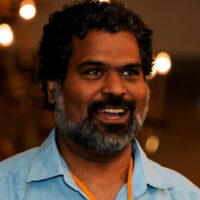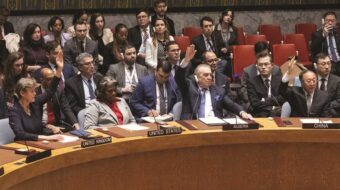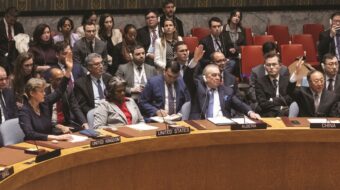NEW YORK – United Nations Secretary-General Ban Ki-moon urged participants in the International Conference for a Nuclear-Free Peaceful, Just and Sustainable World here May 1 to “keep it up.”
Ban told the assembled crowd of nearly 1,000, “On the eve of the nuclear Non-Proliferation Treaty review conference, we know the world is watching. Let it heed our call. Disarm now!”
Ban’s remarks concluded the two-day non-governmental organization (NGO) conference at Manhattan’s historic Riverside Church. It was attended by activists, scholars, elected officials and hibakusha -survivors of the nuclear bombings of Hiroshima and Nagasaki in 1945 – all committed to the complete abolition of nuclear weapons.
The gathering was held days before the opening of the month-long 2010 Review Conference for the nuclear Non-Proliferation Treaty (NPT) at the United Nations. The ministerial conference, held every five years, is aimed at fulfilling the treaty’s goals of stopping the spread of nuclear weapons and dismantling existing nuclear stockpiles.
Riverside Church’s Rev. Dr. Arnold Thomas opened the NGO conference by welcoming the international crowd to a place of history. The Rev. Martin Luther King Jr. gave his famous “Beyond Vietnam” speech at the church in 1967. Nelson Mandela spoke at the church during his first trip to the United States after being freed from Robben Island prison. The Rev. Thomas said that Ban Ki-moon’s speech at the conference was another historical occasion with a “sacred cause.”
Conference participants took part in workshops and panels discussing environmental impact of nuclear weapons, the health implications of uranium mining, the experience of the survivors of Hiroshima and Nagasaki, the success of nuclear-free zones around the world, the role of NATO, foreign military bases and many more topics.
The NGO conference and the subsequent NPT conference occurred at a turning-point moment on the issue of nuclear disarmament. In January, the Bulletin of the Atomic Scientists moved the hands of its Doomsday Clock one minute away from midnight (midnight symbolizing the end of the world in nuclear war), stating, “We are poised to bend the arc of history toward a world free of nuclear weapons.”
Just last month, President Obama and Russian President Dmitry Medvedev signed a new bilateral START treaty reducing nuclear weapons stockpiles. The U.S. and Russia account for 90 percent of all nuclear weapons worldwide. Weeks later Obama then hosted a Nuclear Security Summit in Washington, gathering 47 nations and the United Nations to initiate new measures to control and contain fissionable materials that can be used for nuclear weapons.
Many in the nuclear abolition movement acknowledge a new opening today for reducing and eliminating nuclear weapons. But speakers at the NGO conference, while hopeful, remained committed to total abolition as the only way to ensure prevention of nuclear proliferation and the catastrophic use of nuclear weapons, accidentally or intentionally.
Dr. Terumi Tanaka, secretary-general of the Japan Confederation of A-H Bomb Sufferers Organizations (Nihon Hidankyo), who at the age of 13 experienced the blast of the nuclear bomb dropped on Nagasaki and lost five family members in a flash, told the crowd, “Nuclear weapons should never be allowed to exist for whatever reason. Nuclear weapons are from the devil.”
“The sovereignty of the nations and world peace is essential and cannot be postponed,” said Brazil’s Socorro Gomes, president of the World Peace Council.
The United States is the only country in the world that maintains nuclear arsenals on other countries’ territories and remains the only power to have ever used a nuclear weapon.
“The NPT and nuclear disarmament [are] within the broader peace and social justice and environmental context,” said Kevin Martin, executive director of Peace Action, the largest peace and disarmament organization in the U.S. with 100,000 members. In response to the announcement that the U.S. government would reveal for the first time the count of its nuclear arsenal, he said, “The U.S. now feels that it has to be more transparent. They have to come to the NPT Rev Con [Review Conference] with more than they have been able to produce so far. We are not just satisfied with some of the small steps the Obama administration has taken. We are always pushing for more.”
In closing his remarks to the gathering, Ban Ki-moon said, “Today, we have reason for renewed optimism. Global public opinion is swinging our way. Governments are looking at the issue with fresh eyes. Consider just the most recent events: Leading by example, the United States announced a review of its nuclear posture, foreswearing the use of nuclear weapons against non-nuclear states, so long as they are in compliance with the Non-Proliferation Treaty … And on Monday, we hope to open a new chapter in the life of the Nuclear Non-Proliferation Treaty.”
The conference was followed by a mass march against nuclear weapons on Sunday May 2.
All of the conference plenaries are available to be viewed on the website of Riverside Church.
Photo: Japanese trade unionists march against nuclear weapons, May 2 in New York. (PW/Libero Della Piana)

MOST POPULAR TODAY


Zionist organizations leading campaign to stop ceasefire resolutions in D.C. area

Communist Karol Cariola elected president of Chile’s legislature

Afghanistan’s socialist years: The promising future killed off by U.S. imperialism

High Court essentially bans demonstrations, freedom of assembly in Deep South






Comments